Top of the pageActionset
Meniscus Tear: Rehabilitation Exercises
Overview
A meniscus tear, Opens dialog is a common knee injury. Work with your doctor to plan a rehabilitation (rehab) program. A rehab program will help you regain as much strength and flexibility in your knee as possible. This will likely include physical therapy and home exercises.
Here are some exercises that you might be given. Work with your doctor and physical therapist to design a program that will best help you reach your goals.
Meniscus tear rehab: How to do the exercises
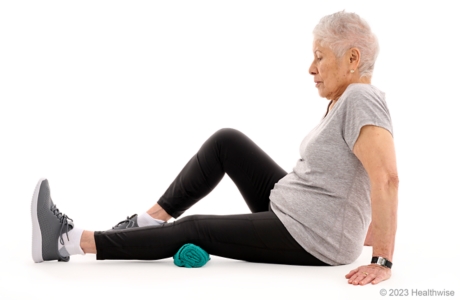
- Sit or lie down on a firm surface or the floor with your affected leg straight. Place a small, rolled-up towel under your knee.
- Tighten the thigh muscles of your straight leg by pressing the back of your knee down into the towel.
- Hold for about 6 seconds, then rest.
- Repeat 8 to 12 times.
- It's a good idea to repeat these steps with your other leg.
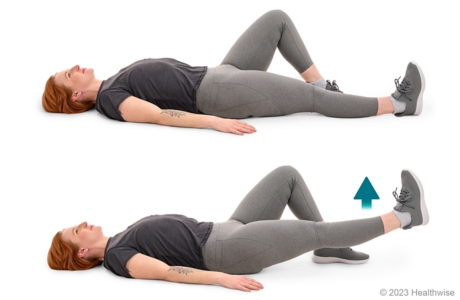
- Lie on your back with your affected leg straight. You can bend your other leg, if that feels more comfortable.
- Tighten the thigh muscles in your affected leg by pressing the back of your knee down. Hold your knee straight.
- Keeping the thigh muscles tight and your leg straight, lift your affected leg up so that your heel is about 12 inches off the floor. Hold for about 6 seconds, then lower slowly.
- Repeat 8 to 12 times.
- It's a good idea to repeat these steps with your other leg.

- Lie on your stomach with your legs straight.
- Keeping your leg straight, lift the toes of your affected leg about 6 inches off the floor.
- Hold for about 6 seconds and then slowly lower your leg.
- Repeat 8 to 12 times.
- It's a good idea to repeat these steps with your other leg.
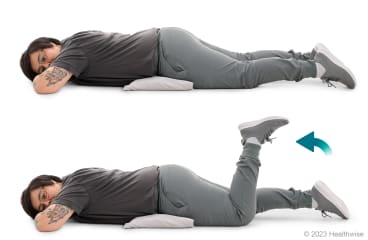
- Lie on your stomach with your legs straight.
- Lift the foot of your affected leg by bending your knee so that you bring your foot up toward your buttock. If this motion hurts, try it without bending your knee quite as far. This may help you avoid any painful motion.
- Slowly lower your foot back to the floor.
- Repeat 8 to 12 times.
- It's a good idea to repeat these steps with your other leg.
- If you're not comfortable, try placing a pillow under your stomach.
- If your kneecap is uncomfortable, roll up a washcloth and put it under your leg just above your kneecap.
When you can do this exercise with ease and no pain, add some resistance. To do this:
- Tie the ends of an exercise band together to form a loop. To hold the band in place, shut a door on the band so the knot is on the other side of the door, or attach one end of the loop to a secure object. (Or you can have someone hold one end of the loop to provide resistance.)
- Loop the other end of the exercise band around the lower part of your affected leg.
- Repeat steps 1 through 5, slowly pulling back on the exercise band with your leg.
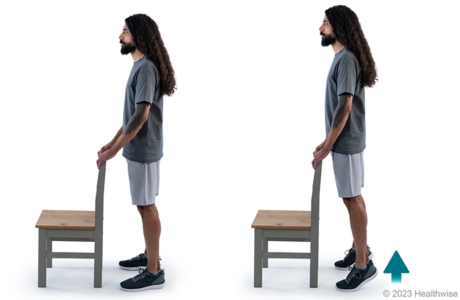
- Stand with your feet a few inches apart, with your hands lightly resting on a counter or chair in front of you.
- Slowly raise your heels 1 to 2 inches off the floor while keeping your knees straight. Hold for about 6 seconds, then slowly lower your heels to the floor.
- Repeat 8 to 12 times.
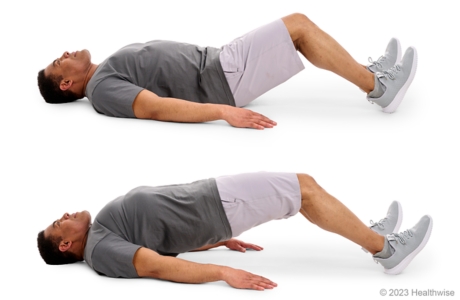
- Lie on your back with both knees bent and your ankles bent so that only your heels are digging into the floor. Your knees should be bent about 90 degrees.
- Tighten your belly muscles by pulling your belly button in toward your spine. Keep breathing normally and don't hold your breath.
- Push your heels into the floor, squeeze your buttocks, and lift your hips off the floor until your shoulders, hips, and knees are all in a straight line. Keep your hips level.
- Hold for about 6 seconds.
- Slowly lower your hips back to the floor.
- Repeat 8 to 12 times.
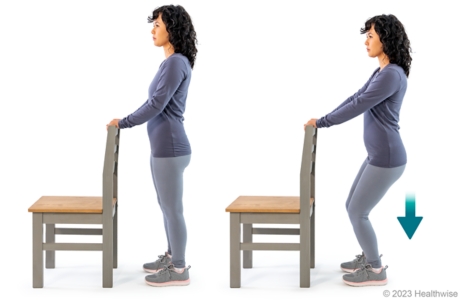
- Stand with your hands lightly resting on a counter or chair in front of you. Put your feet shoulder-width apart.
- Slowly bend your knees so that you squat down like you're going to sit in a chair. Make sure that your knees don't go in front of your toes.
- Lower yourself about 6 inches. Your heels should stay on the floor at all times.
- Rise slowly to a standing position.
- Repeat 8 to 12 times.
Current as of: July 31, 2024
Author: Ignite Healthwise, LLC Staff
Clinical Review Board
All Healthwise education is reviewed by a team that includes physicians, nurses, advanced practitioners, registered dieticians, and other healthcare professionals.
Current as of: July 31, 2024
Author: Ignite Healthwise, LLC Staff
Clinical Review Board
All Healthwise education is reviewed by a team that includes physicians, nurses, advanced practitioners, registered dieticians, and other healthcare professionals.
This information does not replace the advice of a doctor. Ignite Healthwise, LLC, disclaims any warranty or liability for your use of this information. Your use of this information means that you agree to the Terms of Use. Learn how we develop our content.
